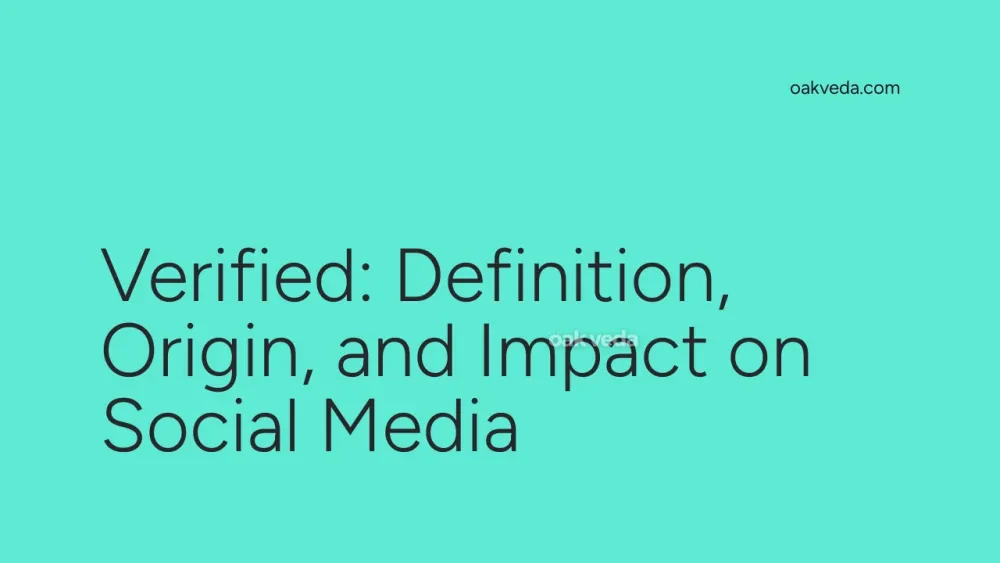
What is Verified?
In the context of social media, "verified" refers to a status granted to accounts that have been officially authenticated by the platform. This verification is typically represented by a small blue checkmark or badge next to the account name. Verified status indicates that the platform has confirmed the identity of the account holder, usually a public figure, celebrity, brand, or other notable entity.
Origin and Development of Verified Status
The concept of account verification was first introduced by Twitter in 2009. It was initially created to prevent impersonation of high-profile individuals and organizations. Over time, other major social media platforms like Facebook, Instagram, and LinkedIn adopted similar verification systems.
As social media grew in importance and influence, the verified badge became a symbol of authenticity and credibility. It evolved from a simple anti-impersonation tool to a mark of status and authority in the digital world.
How Verification Works
The verification process varies across different social media platforms, but generally involves the following steps:
- Application: Users submit a request for verification, often providing personal information and documentation.
- Review: The platform assesses the application based on specific criteria, such as notability, authenticity, and completeness of the profile.
- Confirmation: If approved, the account receives the verified badge.
- Maintenance: Verified accounts must adhere to platform guidelines to retain their status.
It's important to note that the exact criteria and process for verification can change over time and differ between platforms.
Types of Verified Accounts
While the verification process is similar across platforms, there are different types of accounts that can be verified:
- Individual accounts: Public figures, celebrities, politicians, and influencers
- Brand accounts: Companies, organizations, and products
- Media outlets: News organizations, publications, and journalists
- Government accounts: Official government agencies and representatives
Popular Examples of Verified Accounts
Some well-known verified accounts across various platforms include:
- @BarackObama on Twitter
- @natgeo on Instagram
- Coca-Cola's Facebook page
- Microsoft's LinkedIn company page
These accounts represent a mix of influential individuals, major brands, and prominent organizations that have been officially authenticated by their respective platforms.
Impact of Verification on Social Media Culture
Verification has significantly influenced social media culture in several ways:
- Trust and credibility: Users tend to place more trust in verified accounts, viewing them as reliable sources of information.
- Status symbol: The blue checkmark has become a coveted symbol of influence and importance.
- User behavior: People are more likely to engage with and follow verified accounts.
- Information flow: Verified accounts often have greater reach and impact in spreading news and shaping public opinion.
Controversies Surrounding Verification
Despite its benefits, the verification system has faced several controversies:
- Exclusivity: Critics argue that the process favors celebrities and large organizations over smaller, yet influential, voices.
- Inconsistency: There have been complaints about inconsistent application of verification criteria across different users and platforms.
- Monetization: Some platforms, like Twitter, have experimented with paid verification, leading to debates about the true meaning of the verified badge.
- Misinformation: Verified accounts spreading false information have raised questions about the responsibility that comes with verification.
How Brands and Influencers Use Verification
For brands and influencers, verification offers several advantages:
- Increased credibility: The verified badge lends authenticity to their online presence.
- Enhanced visibility: Many platforms give preferential treatment to verified accounts in search results and recommendations.
- Protection against impersonation: Verification helps users distinguish between genuine accounts and potential imitators.
- Access to special features: Some platforms offer exclusive tools and analytics to verified accounts.
Brands and influencers often use their verified status to build trust with their audience, increase engagement, and establish themselves as authoritative voices in their respective fields.
Future Trends Related to Verification
As social media continues to evolve, we can expect several trends in the verification space:
- AI-powered verification: Platforms may employ artificial intelligence to streamline and improve the verification process.
- Blockchain-based authentication: Some experts predict the use of blockchain technology to create more secure and decentralized verification systems.
- Tiered verification: Platforms might introduce different levels of verification based on various criteria.
- Cross-platform verification: There could be efforts to create a unified verification system across multiple social media platforms.
- Greater transparency: In response to criticisms, platforms may provide more clarity on their verification criteria and processes.
FAQs about Verification
-
Can anyone get verified on social media? While anyone can apply for verification, approval depends on meeting specific criteria set by each platform.
-
Does verification guarantee that an account won't spread misinformation? No, verification only confirms the identity of the account holder, not the accuracy of their posts.
-
Can a verified account lose its status? Yes, platforms can remove verification if an account violates guidelines or terms of service.
-
Is there a fee for getting verified? Traditionally, verification has been free, but some platforms are experimenting with paid verification options.
-
Does verification affect an account's reach or engagement? While not guaranteed, verified accounts often see increased visibility and engagement due to their perceived credibility.
In conclusion, verification has become an integral part of the social media landscape, shaping user trust, influencer culture, and online interactions. As platforms continue to refine their verification processes, the blue checkmark remains a powerful symbol of authenticity in the digital world.
You may be interested in:
- Engagement Rate: Definition, Origin, and Impact
- PFP: Definition, Origin, and Impact on Social Media
- Social Media Handle: Definition, Origin, and Impact
- NPC (Non-Player Character): Definition, Origin, and Impact
- Side-Eye: Definition, Origin, and Impact on Social Media
- Link-in-Bio: Definition, Origin, and Impact on Social Media

